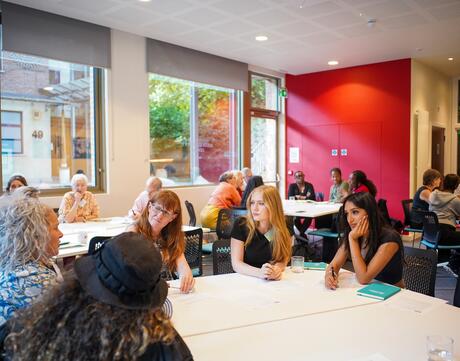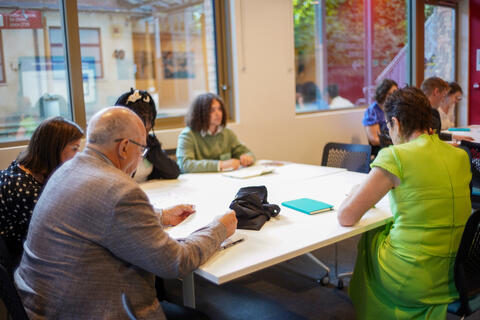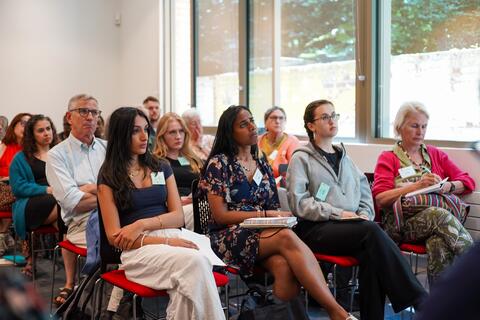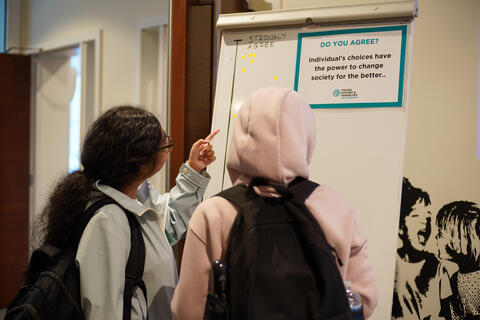Facing History & Ourselves UK was established in 2004. This year marks our 20th anniversary, and to celebrate we held two showcase events.
We started with ‘An Afternoon of Dialogue’, inviting our community of supporters to meet our students, teachers and partners for conversation and learning. Together we explored how we can use our individual civic agency to best effect. We wanted to bring together our community to think about the positive impact we can have as individuals, inspired by the actions of Facing History students.
“Hope, cohesion and building a stronger democracy are not things that happen by accident - we need to seek out new perspectives, challenge our assumptions and find ways to work more collaboratively.”
Beki Martin – Executive Director, Facing History UK
Throughout the afternoon we saw our students, teachers and supporters meet this call by engaging in nuanced conversations around complex topics. At Facing History our goal is to create safe spaces for young people to ask questions, so that they are prepared to grapple with the present, through the lessons of the past.
2 people sit on a stage having a conversation
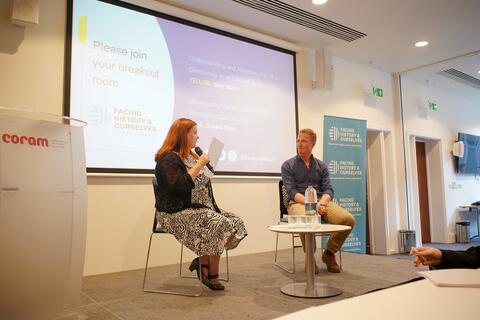
2 people sit on a stage having a conversation
Beki Martin and Jon Alexander having a discussion during the opening session of the day.
Keynote speaker Jon Alexander, author of ‘Citizens: Why the Key to Fixing Everything is All of Us’ and co-founder of the New Citizenship Project, kicked us off with some fascinating insights into what active citizenship looks like around the world.
Stories are integral to Jon’s approach. He believes that by embracing, enacting, and fortifying ‘the Citizen story’, we will be able to face the challenges of economic insecurity, climate crisis, public health threats, and political polarisation, together.
These are all themes that can be addressed with the support of Facing History’s pedagogical approach, and indeed we explored several in the three interactive breakout sessions that followed.
Breakout Sessions
-
Developing Media Literacy Skills to Strengthen Our Society
This session explored the media literacy skills needed to navigate the current information landscape. Our panellists discussed how information is created, circulated and consumed, the impact this can have on well-being, relationships and democracy, and what we can do to respond to these risks.
-
Understanding and Assessing the UK’s Democracy in an Election Year (A Classroom Experience)
This session gave attendees the opportunity to participate in activities from our lesson ‘Understanding and Assessing the UK’s Democracy’, which provides a framework for assessing a democracy’s health, and explores the strengths and weaknesses of the UK’s parliamentary democracy.
-
Standing Up Against Racial and Religious Hatred
Amid the rise in racial and religious hatred, there is a pressing need for each of us to be equipped with critical thinking, civil discourse and empathy-building skills. In this session, we explored how we can hold sensitive and brave conversations, and highlight the impact that is possible when we engage in community and interfaith dialogue.
We finished our ‘Afternoon of Dialogue’ with a student panel entitled ‘Change Starts with Us: Student Voices Shaping the 21st Century’. We were delighted to be joined by five students and Facing History teacher leader Sharon Aninakwa. An honest and forthright conversation was had across a range of subjects, focusing on social media in particular and the pressures felt by all sides on this contentious topic.
“An inability or unwillingness to provide a safe space in which we can ask the questions we are grappling with limits our ability to form and voice educated opinions. It limits our ability to speak with knowledge and with confidence. We need safe spaces to ask questions, to understand, to empathise.”
Tallulah – Facing History Student
Tallulah’s comment speaks to the importance of Facing History’s work in supporting young people to develop resilience, critical thinking and media literacy skills, and to respond to people and information with both empathy and a critical lens.
Throughout the day, people were encouraged to take part in our activation stations, to share what they had learned and consider what actions they would like to take to be more active citizens. As part of this, we had two student reporters capturing the sessions and interviewing speakers and guests. Look out for their blog post coming soon!
Building on our ‘Afternoon of Dialogue’, our evening event centred the voices of three individuals who have been directly impacted by the recent conflict in the Middle East - Mira Awad, Hamze Awawde and Magen Inon.
We were also pleased to be joined by some of our founding supporters and trustees who started on this journey with us 20 years ago. Their support has been invaluable and we are proud of the community we have built together and its dedication to standing up to bigotry and hate.
We opened the evening with a teacher-student duo who brought the power of Facing History into the room. Marion Rasekh, Associate Assistant Headteacher at Chesham Grammar School and Facing History teacher for over 15 years, spoke about her first encounter with Facing History and how it has become a fundamental part of her teaching and leadership in every setting she has worked in.
“Facing History has helped me realise my educational philosophy: we are not merely conduits of information but architects of change!”
Facing History student Tallulah was next to step on to the stage, where she shared her experience of taking part in an event at the Houses of Parliament, hosted by the National Citizens Service and led by the Faith & Belief Forum. Talullah was one of 12 young people who spoke with MPs, members of the Lords and civil servants about the impact of the 7 October 2023 attacks and ensuing violence in the Middle East on their own lives.
Tallulah was certainly a tough act to follow, and her passion and empathy set the stage for the trio of peace activists who followed.
Speaker Biographies
Together our three speakers shared their personal stories of the 7 October attack and experiences of living and working in the region. The common theme was one of a desire to come together in the face of this adversity - that we don’t need to agree on everything to acknowledge each other’s pain and work towards peace.
“Somehow it didn’t used to be that extreme, but now it is. We cannot see the humanity in the other side. Whether it's the soldier, politician, nurse or person in the street, it’s all the same. I refuse to accept this.”
Hamze Awawde
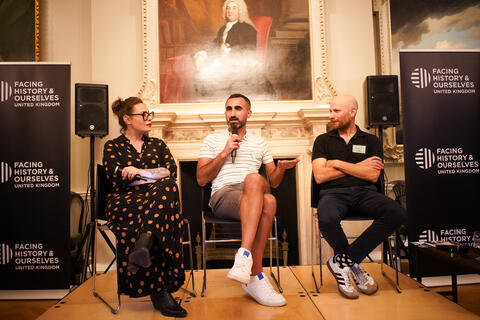
Mira Awad, Hamze Awawde and Magen Inon on stage for their conversation during the evening.
A highlight of the evening was the open and honest Q&A, where people had the opportunity to ask questions of Mira, Hamze and Magen. We ended with such thoughtful and heartfelt dialogue that truly reflected Facing History’s approach.
Hamze and Magen have spoken together on a number of occasions in recent months. They know that this type of open conversation is crucial to a peaceful future and are driven by a shared ambition to try to ensure that their sons would be friends.



